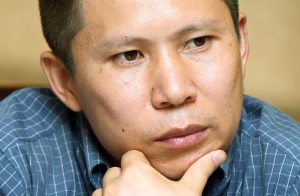In nearly all of his essays, Xu Zhiyong yearns for a democratic China, or what he calls “a beautiful China.” His unwavering commitment to a just, fair, and free China has resulted in a 14-year prison sentence for “subversion of state power,” handed down Monday morning in Shandong Province.
Punished alongside Xu is lawyer Ding Jiaxi, sentenced to 12 years for working with Xu to build up a “Citizens Movement” and disseminate his writings. Xu’s partner, rights activist Li Qiaochu, has been charged with “inciting subversion” for telling the world that he had been tortured in custody and for sharing his work. Her physical and mental health has seriously deteriorated as she languishes in custody.
What does it mean to subvert state power in China? How can words calling for the rule of law, democracy, and freedom of speech topple a government that claims such rights are already protected? When the Chinese Communist Party (CCP) sees a writer putting forth a vision of China that includes genuine participation from the people, they see an act that endangers national security: also known as their grip on power.
The CCP tells us in the indictment against Xu Zhiyong, just how afraid it is of his words. Cited as “evidence” of subversion are Xu’s essays and book “A Beautiful China,” which he wrote after his release from prison in 2017, as well as his activities to share his vision, such as online group chats and gatherings to discuss these ideas. So-called criminal behavior is speech that declares, “I am a citizen. I am not a subject, nor a docile member of the masses.”
As Xu Zhiyong said in his court statement released by supporters ahead of the verdict, “I want to have a dream: a beautiful China, with beauty and liberty, fairness and happiness. It will be a democratic China.” Of course, his vision clashed with the CCP’s claim that its one-party authoritarian grip on power is, in fact, a “democracy” where the people enjoy freedom of speech and human rights.
Xu Zhiyong is China’s voice of conscience. Previously imprisoned for four years for advocating for equal education rights for migrant workers’ children and against corruption, he could have remained silent after his 2017 release from prison but refused. In December 2019, Xu went on the run after police began to round up the participants of a private gathering of lawyers and civil rights advocates he co-organized with Ding Jiaxi that month. Despite his precarious situation, he continued to write. He boldly called on Xi Jinping to step down for his failures in leadership.
Xu also bore witness to the CCP’s disastrous response to the initial outbreak of COVID-19 in Wuhan. “This pandemic is the result of the lack of freedom of speech,” he wrote on February 8, two days after the death of Dr. Li Wenliang, a Wuhan doctor who tried to warn others about COVID-19 and was silenced by the government before succumbing to the virus himself. A week later, police caught up with Xu. It was the last essay he released before his detention.
The CCP has long feared the power of the pen. Freedom of expression is systematically suppressed in China through tight control over the media and publishing industry, as well as widespread Internet censorship. Authorities have responded particularly harshly to those who criticize them and offer an alternative vision of governance based on free expression and human rights: they persecuted Nobel Peace Prize laureate Liu Xiaobo to his death in 2017 because he co-authored a manifesto calling for a process to democratize China. The Party imprisoned Uyghur scholar Ilham Tohti for the rest of his life because he wrote and advocated for Uyghurs to be treated equally. Hong Kong lawyer Chow Hang-tung is languishing behind bars because, among other supposed crimes, she wrote a Facebook post and article appealing to Hongkongers not to forget the 1989 Tiananmen Massacre.
As Xu wrote in one chapter of “A Beautiful China,” the Citizens Movement advocated for Chinese to “take the identity, rights and responsibilities of being a citizen seriously.” Whether or not they read his essays, Xu’s vision was realized during the “White Paper” protests that swept the country in November-December 2022. Thousands of Chinese embraced their responsibilities as citizens to speak out against the government’s pandemic policies and for its victims. Although the police may have arrested several protesters, they cannot extinguish the yearning within many in China to voice their opinion and speak freely in society. It is no coincidence that Xu Zhiyong and the White Paper protesters both quoted from the first line of the country’s national anthem, “Arise, we who refuse to be slaves!”
We live in an interconnected global society. Climate change and pandemics don’t stop at borders and China is the second-largest economy in the world. The people of China have a right to freedom of expression and that right must be defended. It is the responsibility of the international community to protect the freedom to write everywhere in the world.
In 2020, PEN America awarded Xu Zhiyong the PEN/Barbey Freedom to Write Award, with the aim of putting pressure on the Chinese government to release Xu. As our then-president, novelist Jennifer Egan, said at the announcement, “we pledge that his voice will not be silenced, nor his name erased. We will fight on his behalf until he is free.” We will not relent until Xu Zhiyong is released from prison.
































